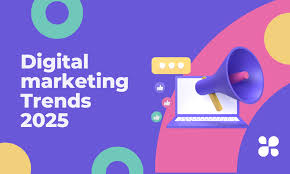
Digital marketing has significantly evolved over the years, transitioning from basic strategies to more advanced, technology-driven approaches.
In the past, digital marketing rotate around static ways like SEO-focused blogs, email newsletters, and text-based content. Social media engagement was limited to posts, likes, and comments, with platform like Facebook and Twitter dominating the space.
Advertising strategies were primarily centered on PPC drive, banner ads, and simple retargeting methods. Influencer marketing, too was restricted to macro influencers and celebrities, while customer integration relied on bulk emails and basic help channels.
Today’s digital marketing has embraced advanced technologies like artificial intelligence (AI), machine learning augmented reality (AR), and blockchain, providing personalized and interactive experience. Video marketing, especially short-form content on platform like TikTok and Instagram Reels, has replaced static content as the primary driver of engagement.
Digital marketing is a constantly evolving field, and staying updated with the latest trends is essential for businesses and marketers. In 2025, digital marketing will continue to adopt to technological advancements, consumer behavior shifts, and new opportunities for brands.
In this article we will explore most crucial digital marketing trends to look in 2025 and how it can support in your marketing strategies.
Digital Marketing Trends
1. AI-Powered Marketing Automation
AI-powered marketing automation is revolutionizing how businesses manage their marketing processes through streamlining repetitive tasks, increasing personalization, and improving general efficiency. Through holding artificial intelligence, marketing automation tools can analyze vast amounts of data, identify patterns, and make
immediate decisions to deliver most targeted effort. These tools permit businesses to automate tasks such as email marketing, ad placement, social media scheduling, and customer segmentation, securing that the right message reaches the right audience at the right time.
Advanced AI algorithms also authorize predictive analytics, supporting marketers forecast customer needs and design proactive strategies.
Moreover, chatbots and virtual assistants powered through artificial intelligence improve customer interactions through giving instant responses and tailored recommendation. While AI-powered marketing automation significantly decrease manual efforts and boosts ROI, it also needs careful management of data privacy and ethical considerations to make certain compliance with global regulations. As businesses continue to adopt this technology, AI-driven automation is set to be a cornerstone of effective, scalable, and customer-focused marketing strategies.
2. Voice Search and Conversational Marketing
Voice search and conversational marketing are transforming the method businesses interact with their audiences, providing more natural and intuitive communication channels. With the enhancing use of voice assistants like Siri, Alexa. and Google Assistant, consumers are now searching for information using voice commands, which are usually longer and more conversational than traditional text-based queries.
This shift has made it crucial for businesses to optimize their content for voice search through focusing on natural language and question based keywords. Conversational marketing, on the other hand, leverages immediate, personalized communication by tools like chatbots, live chat, and messaging apps as WhatsApp.
These tools authorize businesses to engage directly with customers, giving instant responses, altered recommendation, and a seamless experience. Together, voice search and conversational marketing create opportunities for brands to connect with their audience in a more personal and engaging method, increasing customer satisfaction and driving loyalty.
Together, Voice search and conversational marketing make opportunities for brands connect with their audience in a more personal and engaging method, increasing customer satisfaction and driving loyalty. As these technologies continue to develop, businesses that adopt and optimize for them will gain competitive advantage in meeting the growing demand for convenience and immediate interaction.
3. Video Marketing and Interactive Content
Video marketing and interactive content have become crucial components of modern digital strategies, providing engaging and dynamic methods to capture audience attention. By 2025, the rise of platforms like TikTok, YouTube, and Instagram Reels, short videos content has taken center stage, authorizing brands to communicate their message quickly and effectively.
Videos not only boost engagement but also improve retention, as they are more visually appealing and easier to consume compared to text based content.
Moreover, traditional video, interactive content such as quizzes, polls, 360-degree videos, augmented reality (AR) experiences, and gamified elements are getting popularity. These formats actively require the audience, fostering deeper connections and encouraging participation.
Interactive polls on social media drive engagement while giving valuable insights into customer preferences. Through combining storytelling with interactivity, video marketing and interactive content support brands make memorable experience, increase reach, and manage conversions.
While consumer preference continue to favor immersive and participatory formats, businesses that invest in these strategies will stay ahead in gaining audience attention.
4. Influencer Marketing Evolution
In 2025, Influencer marketing will remain a key operator of successful digital marketing strategies. Influencer marketing has develop significantly through out the years, transitioning from celebrity endorsement to a more authentic and Niche handle approach. In its early stages, brands primarily collaborated with high profile celebrities and macro-influencers with millions of followers to gain widespread exposure.
While this marketing strategy usually generated large-scale visibility, it lacked personal connection and trust with specific audience segments. Gradually,
the hub has shifted towards micro-influencers and nano-influencers individuals with smaller however widely engage and loyal followings. These influencers care seen as more relatable and credible, creating their recommendations more impactful for niche markets.
Additionally, platforms like Instagram, TikTok, and YouTube have democratized influencer marketing, providing everyday creators to develop their own communities and collaborate with brands. With the rise of authenticity as a key driver, audiences now value genuine content over overly polished advertisements.
Furthermore, data analytics and AI have increased the method brands identify and measure influencer performance, making certain campaign deliver targeted results. As influencer marketing continues to grow, its evolution reflects a shift toward meaningful relationships, transparency, and altered strategies that resonate with specific audiences.
5. Personalization and Data Privacy
Action Plan for Marketers in 2025 and Ahead

Here are digital marketing action plans for marketers including:
- Stay updated on artificial intelligence (AI) tools and use them for automation.
- Marketers should invest in video and Augmented Reality (AR) and Virtual Reality (VR) based marketing.
- Marketer’s must focus on personalized and ethical data-driven marketing strategies.
- Create collaboration with micro-influencers for authentic integration.
- Adapt to emerging search technologies, including voice and visual search.
While, through keeping ahead of these trends, businesses can remain competitive and relevant in the rapidly developing digital landscape of ahead.
Core Disciplines of Digital Marketing?
Digital marketing comprises several core disciplines, each focusing on various strategies and tactics to reach and integrate target audience effectively.
Below are the key disciplines of Digital Marketing:
- Search Engine Optimization (SEO): SEO is the process of optimizing a website to rank higher on search engine results pages (SERPs). Search engine optimization (SEO) focuses on improving organic visibility by keyword research, on-page optimization, backlink building, and technical SEC.
- Content Marketing: Content marketing requires creating and distributing valuable, relevant, and consistent content to attract and engage a target audience. This can include blog posts, videos, infographics, podcasts, and many more.
- Social Media Marketing: Social media marketing platforms like Facebook, Instagram, LinkedIn, and Twitter to promote brands, engage audiences, and drive website traffic. It includes both organic strategies and paid advertising.
- Email Marketing: Email marketing requires sending targeted emails to nature leads, promote products, and maintain customer relationship. It’s a cost-effective method to reach a highly engaged audience.
- Affiliate Marketing: Affiliate marketing requires partnering with affiliates who promote your products or services and earn a commission for sale or lead they generate.
- Analytics and Data Analysis: Analytics and Data Analysis demands collecting, measuring and interpreting data to understand the performance of marketing efforts and make informed decision. This discipline focuses on using metrics and insights to optimize strategies, increase user experiences, and achieve desired outcomes.
Through measuring these core disciplines, businesses can build a comprehensive digital marketing strategy altered to their objectives.
Conclusion
In conclusion, digital marketing trends underscore the importance of adaptability, innovation and authenticity. Businesses must embrace these advancements while remaining customer attention, prioritizing trust and personalization to thrive in a competitive digital environment.
The companies that can successfully blend cutting-edge technologies with ethical, consumer-centric practices will not only achieve their marketing objectives but also create lasting loyalty and reputation in an increasingly concerns.
FAQs
What is digital Marketing?
Digital marketing is the practice of promoting products or services. Digital marketing leverages online platforms to connect with target audiences, build brand awareness, and manage sales by strategies like SEO, content marketing, social media marketing, and pay-per-click (PPC) advertising. Digital marketing is data managing, permitting businesses to track performance in immediate, optimize efforts, and achieve measurable results, making it a cost-effective and impactful method to reach a global audience.
what is the future of digital marketing in 2025?
what are the 5 P's of marketing plan?
what is an action plan for a marketing plan?
what is the next big trend in digital marketing?
what are the 10 top 10 topics for digital marketing?
Here are top 10 topis:
- Artificial Intelligence (AI) in Marketing
- Content Marketing
- Search Engine Optimization (SEO)
- Social Media Marketing
- Pay- Per-Click Advertising
- Data Privacy and First-Party Data
- E-commerce and Social Commerce
- Voice Search and smart Devices
- Analytics and Big Data
- Augmented Reality (AR) and Virtual Reality (VR)
While, these topics reflect the rapid evolution of digital marketing and the need to stay innovative and customer attention.
what are the four types of digital marketing?
Four types of digital marketing:
- Content Marketing
- Search Engine Marketing (SEM)
- Social Media Marketing
- Email Marketing





